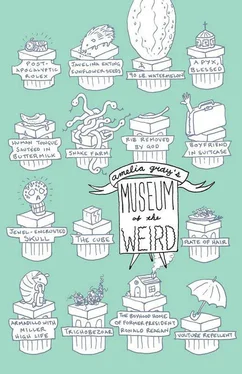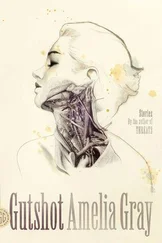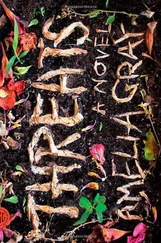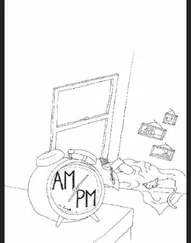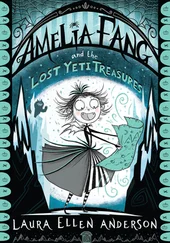This statement takes a moment to sink in — leaving means walking many days without direction in a gravel pit.
SAM
Don’t go, Linda. I was just having a little fun.
DAVE
Come on. You just got here.
LINDA
No, it’s okay. I have this
appointment in a couple weeks. I
should really start heading in that
direction.
SAM (desperate)
Linda, I’m sorry.
LINDA
Don’t be sorry. I’m sorry.
DAVE
I am also sorry.
LINDA
We are all sorry, then.
She regards the two men with disappointment before turning and walking in the direction from which she came. They watch her go. After a minute, DAVE turns to look at SAM, his expression unclear.
THE END
There once was a woman who lived on the far edge of town, where the houses had courtyards and vegetable gardens. The woman grew a small amount of flowers and vegetables in her garden, a small plot behind her house. The picture window in her bedroom faced the garden, and she spent many happy weekend hours watching the scene.
One day, she turned away from the window and noticed that the rest of her room looked darker than usual. She assumed that her eyes had gotten too used to the brightness of the window but the room grew darker and darker by the hour and finally vanished into blackness. The window, however, was bright with sunshine and color. She looked out at the beautiful garden for a long while, frightened to look away, and when she finally did look away again she was confronted with total darkness, and she cried and touched the walls and found her telephone and called her doctor.
The woman’s doctor and his colleagues were entirely baffled. They traveled to the woman’s house, tested her sight, and found it to be entirely disintegrated. At the window, she seemed to recognize the plants and flowers by general color and shape, but when one of the doctors stood in the garden, waving to her through the open space, she continued describing geraniums and the leafy tops of the carrots as if they were all she saw.
Baffled, the doctors stood in the kitchen and discussed the ethics of their situation. It was only right to tell her the truth: the tests on her corneas and pupils had revealed no reaction, and it was total blindness. They were drinking coffee, which they had made for themselves. Certainly, the doctors reasoned, they would tell her to be prepared for the worst while they did some final tests.
When they told the woman that her selective blindness was focused on her window, and perhaps the condition was permanent, the woman looked out the memory of her window and nodded, though she didn’t entirely understand. Sunlight filtered in through the tall trees and lit the grass and the garden in shades of green and brown. Soft breezes rustled the leaves and gave her a comforting sense of the wide, changing world. The doctors quietly washed their coffee cups and left them to dry next to the sink.
The woman passed many satisfactory days at her picture window. When she opened her eyes in the morning, she was always briefly afraid of the darkness, but out of the corner of her eye she was comforted by the sight of the glowing window. She stumbled and touched the walls and found her shower, and then dressed herself for the day and dug in her pantry for breakfast. In those first days, she was ashamed to call her friends, so instead she worked through the canned foods in the pantry for basic sustenance. She spooned up pieces of tuna while watching the wind work through the leaves of her summer squash. She tried to go outside, was disturbed by the blindness that remained, and headed back inside.
The woman was suspicious of the idea of selective blindness. The doctors asked how her garden looked when they called. She stopped asking about the test results and they did not offer them. She sat in front of the window and held her hand in front of her face. All she saw was the garden. She was a smart woman but the blindness made her desperate, and she convinced herself that the selectivity of her condition actually blocked out anything but pure beauty, and that was why she couldn’t see her shower curtain or her stove or even her own body, but still saw so vividly the outside world from inside.
And then, because it eventually had to happen, word got around town. It was only a matter of time before the woman’s home became somewhat of a local attraction. A steady stream of students and church groups and retired folks and scientists and psychics and skeptics passed through her doors. Her friends joked that she should take admission, and eventually set up a donation box by the door. They requested any amount for the upkeep of the house as well as care for the poor woman, which they had all partially assumed. The woman woke in the morning to gentle knocking at her bedroom door and sometimes fell asleep at the window and had to be moved into bed by her devoted friends and visitors.
As one grows used to anything, the woman grew used to her visitors. They were friendly, after all, and brought gifts, and told her news from the town and the world beyond, and listened with great interest to events of the garden only she could see. Skeptics sometimes tried to convince her that her vision was false, that there were clouds where she saw solid blue sky, that many of the plants she was describing had in fact died long before and had been replaced with flowers or trees planted by other visitors. The skeptics were hauled out and denied reentry, and the woman was reassured by those who remained that everything she saw was real. A theory had begun to circulate among the believers that the woman’s vision of the garden was the true vision, and what they all suffered to see approached the ideal but would never reach it.
The woman’s vision never faded. On the day she died, she described caterpillars ascending the vines on the far wall and sunning themselves on wide leaves. After her death, the towns people made plaques and intricate pieces of art in the woman’s honor and created a holiday within the town wherein everyone was required to look very closely at something and to discover something new about it. In this way, they turned the woman’s vision and eventually the woman herself into an idea, and their own ideas became much easier to believe.
The man had always aspired to live his life as inoffensively as possible, and when his woman came home one evening and found he was gone, she was sure for days that he was around there somewhere. Perhaps he had gone to the bathroom and was in there, quietly creaking, making silent curses over the pipes. Maybe he was in the attic. Or maybe he was working late, something he did not treasure but did with a kind of silent pride that suited him and had always bothered her.
After a few days, it became apparent that the man was not in the backyard or behind the television. She grew nervous, imagining how disappointed he might be upon returning to find that she had not kept the house clean. Indeed, she had forgotten she was in a house at all, and had scattered newspaper across the bedrooms and allowed branches to crowd the door. A thin skin of dust covered the bookshelves and countertops and toaster oven and toilet tank, her desk and his desk. It piled up like snowdrifts in the framed pictures on the wall. She tossed and turned in the bed until the covers parted and formed a protective whorl around her body.
The woman stopped leaving the house. She decided that if her man peeked through the window or knocked lightly on the door and realized that she had gone, he would leave for good. She ate all the fresh food in the house, and then all the canned food, and then the expired food, and then the spices. She washed tablespoons of cinnamon down with tap water. She reached out the windows, pulled leaves from the trees and ate them with the last of the salad dressing. She released the cats so that she would not eat them, and then she ate their food.
Читать дальше
